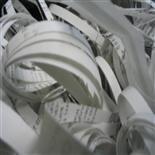
Reduce:
Reduce the amount of junk mail that comes through the door either join the mailing preference service or write “refused please remove from your mailing list” and send the item back to Royal Mail who will forward it on to the company.
Re-use:
Some items such as envelopes and other protective packaging can be reused. All that needs to be done is stick a new label over the top of the old address. Saving you money on envelopes and packaging while helping the environment as new materials are not used up.
What happens to plastic when it is recycled?
Stage 1:
Plastic bottles are deposited in the recycling banks.
Stage 2:
Plastic bottles are collected from the recycling banks and transported to a ‘materials reclamation facility’ (MRF).
Stage 3:
The bottles are sorted into different types of plastic.
Stage 4:
Bottles are squashed into tightly packed blocks.
Stage 5:
Powerful bailing machines squash the air out of the bottles to make them easier to transport.
Stage 6:
The plastic is then transported to a reprocessing factory where it is granulated.
Stage 7:
The granulated flakes of plastic are then made into new products such as garden furniture, fleeces, pipes and coat hangers.
Recovery:
Some types of paper that cannot be recycled are:
Food contaminated paper e.g. fish and chip wrappers, pizza boxes, etc, waxed paper, oil soaked paper, carbon paper, sanitary products or tissues, thermal fax paper and stickers.
Paper types such as these should be sent to energy recovery plants (incinerators) so that some energy can be recaptured and put to good use.
Fascinating Facts:
- One tree can produce 15,000 sheets of A4 paper
- It takes 15 - 17 trees to make 1 tonne of paper
- Approximately 50 acres of rain forest are destroyed every minute
- The average household throws away around 3kgs of paper every week
- Nearly 5 million tonnes of paper is dumped in landfill or incinerated without energy recovery every year
- Only 30% of paper is recycled in the UK
- Using waste paper to make new paper uses 70% less energy than using wood pulp